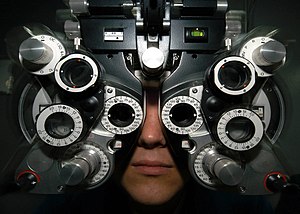Optometry

The Optometry ( Greek. Optike "doctrine of the visible", optiko "for seeing properly" to opsis "seeing" and 'metron' Greek. Μετρική "count", "measurement") is the science of measurement and evaluation of visual functions. It includes biological and physical optics . The foundations for technical and university education in the field of optometry were largely developed in Germany by Hermann Pistor .
Optometry also describes a field of activity that deals with the correction of ametropia . Optometry is a supplement to "monocular" optics insofar as it deals with "binocular" disorders.
Main areas of activity
In contrast to ophthalmic optics , which deal with the individual eye as an optical instrument and is primarily a manual activity to determine, adapt and manufacture optical aids and corrections (such as glasses or contact lenses ), optometry focuses on two-eye vision ( Binocular vision ) and demands the measurement and assessment of the following visual functions:
- adaptation
- Accommodation (process of changing the refractive power of an eye ... to adjust to a certain object distance)
- Resolving power (spatial)
- Resolution capacity , time (Flickerempfindlichkeit)
- Hand-eye coordination
- Gaze motor skills (external eye motor skills )
- Binocular vision
- Motion vision
- Glare sensitivity
- Twilight vision (including night vision)
- Color vision
- Fixation with the help of convergence
- Fixation with the help of accommodation
- Fixation with the help of gaze movements
- Fixation with the help of gaze jumps ( saccades )
- fusion
- Iris motor skills (pupillary play)
- Contrast perception (contrast sensitivity)
- Visual acuity
- Spectral sensitivity
- Day vision
- Differentiation of depth (spatial vision, stereopsis )
- involuntary eye tremors ( nystagmus )
- visual constants of perception
- Ophthalmoscopy or observation of the fundus
- Perimetry
- Anterior segment inspection
- Tonometry
controversy
In connection with prism corrections, optometry deals with areas that are also assigned to strabology , which is a specialty of ophthalmology . There is therefore a controversial discussion among ophthalmologists , optometrists , orthoptists and opticians about the extent to which optometrists, at least in Germany, partially exceed the limits of diagnostic and medical-therapeutic action in this area and thus expose themselves to the risk of practicing medicine , which requires a license to violate the Heilpraktikergesetz .
education
The training to become an optometrist usually takes place at the university. In the Anglo-Saxon countries and Switzerland, the degree is e.g. B. Bachelor of Science (UK) or Doctor of Optometry (USA). Ophthalmic optics / optometry can be studied at six universities of applied sciences in Germany. As a consequence of the so-called Bologna Declaration , since the winter semester 2005 the German universities of applied sciences have only offered Bachelor of Science courses as the first professional qualification in ophthalmic optics / optometry. Based on this, there are various master’s courses , e.g. B. for the "Master of Science in Clinical Optometry". A doctorate to the Doctor of Philosophy is also possible. In Switzerland, a course in optometry (BSc optometry) has been offered at the University of Applied Sciences Northwestern Switzerland in Olten since 2007.
The following German universities of applied sciences offer a course in ophthalmic optics / optometry:
- FH Aachen
- Aalen University
- Beuth University of Applied Sciences Berlin
- Ernst Abbe University of Jena
- University of Applied Sciences Munich
Austrian University with Optometry Studies:
- Danube University Krems (Master's degree)
Swiss University of Applied Sciences with a degree in optometry:
- University of Applied Sciences Northwestern Switzerland , Institute for Optometry in Olten
Higher technical schools with optometry courses:
- ZVA-Bildungszentrum - Academy of Ophthalmic Optics
- Higher technical college for ophthalmic optics (HFA) in Cologne
- Technical School for Ophthalmic Optics (FFA) in Munich
- Technical school for ophthalmic optics "Hermann Pistor" Jena
- Fielmann Academy; Non-profit educational institution of Augenoptik GmbH
- Specialist academy for optics in Hankensbüttel
Optometrist
People who do optometry are called optometrists . This also includes opticians without special training or further education in optometry, but with a master's certificate . There are considerable training-related, professional-political and legal differences between the Anglo-Saxon-speaking countries, especially the USA, and Germany with regard to the practice of optometry, which is why the principles on which these activities are based cannot be compared with one another and the framework conditions cannot be transferred at will. Strictly speaking, the term optometrist in Germany is only a synonym for optometrist . In the medium to long term, however, a realignment of the professional profile of opticians / optometrists by representatives of the profession nationally and internationally is aimed at
Switzerland
Since February 1, 2020, the optometrist has been subject to the Swiss Health Professions Act (GesBG for short). As a result of the changed legislation, optometrists are now allowed to use diagnostic ophthalmics and recommend or prescribe therapies. Practice as an optometrist is therefore regulated and requires a permit. Graduated opticians or people with an equivalent training that is completed before January 31, 2020, retain their acquired rights to practice.
See also
Web links
- Ophthalmic optics / optometry course at Beuth University of Applied Sciences Berlin
- Optometrist (ZVA)
- Academically trained optometrists in Austria
- ZVA education center
- Ophthalmic Optics Academy (PDF; 172 kB)
literature
- Christian Stebler: Guide to Optometry Practice. DOZ, Heidelberg 2012, ISBN 978-3-942873-11-6 .
Individual evidence
- ↑ Wolfgang Cagnolati: The German eye optics and optometry in international comparison. ( Page no longer available , search in web archives ) Info: The link was automatically marked as defective. Please check the link according to the instructions and then remove this notice. In: Deutsche Optikerzeitung. DOZ. Issue 2, 2008, ISSN 0344-7103 , pp. 14-21.
- ↑ Federal Office of Public Health FOPH: Health Professions Act and implementation law come into force on February 1, 2020. Retrieved December 21, 2019 .
- ↑ State Secretariat for Education, Research and Innovation SERI: Ophthalmic Optics / Optometry. Retrieved December 21, 2019 .